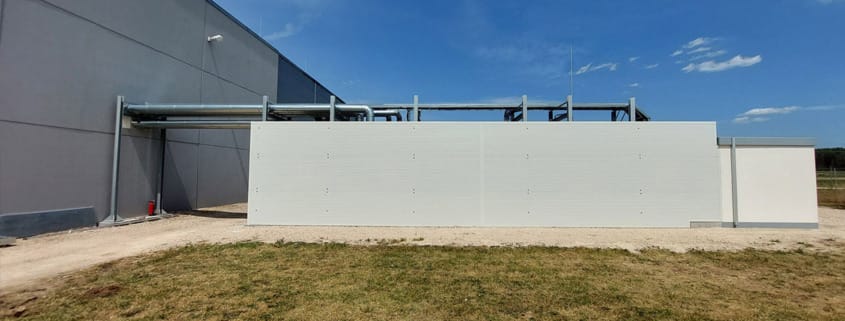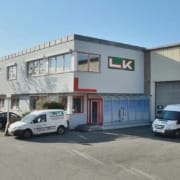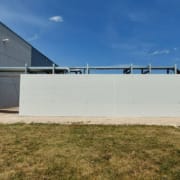Information on noise barriers in the industry
On this page you can find out how industrial companies can solve noise problems with a noise barrier.
When a noise barrier makes sense
When noise protection regulations and legal requirements must be complied with
There are strict noise protection regulations in industry.
The Federal Immission Control Act (BImSchG) and the Technical Instructions on Noise Abatement (TA Lärm) stipulate that unavoidable noise must be restricted in many situations.
Demonstrating social responsibility in the community
By reducing noise for local residents, more and more companies are strengthening their reputation in the immediate vicinity.
For example, LK Metall has installed a noise barrier for a well-known manufacturer of food products from the Middle Franconian region for precisely this purpose.
Increased attention due to reduced noise
Prolonged exposure to noise can cause serious health problems.
These include stress-related illnesses, high blood pressure and hearing loss.
Noise barriers protect residents and employees from these risks.
They contribute to a pleasant environment.
Noise is distracting and hinders the creative flow.
A soundproof wall helps concentration and increases the performance of everyone protected from noise.
Different types of noise barriers for industrial applications
The sound insulation wall industry offers various types of walls.
Mobile noise barriers
Mobile walls score points above all for their maximum flexibility.
They can be easily moved.
This makes them particularly suitable for temporary use or to combat individual sources of noise.
Permanently installed noise barriers
Solid walls made of concrete, steel or wood offer first-class sound insulation and high quality.
They provide good sound insulation for entire hall areas.
Pro: They are durable and low-maintenance.
Cons: Installation is complex and expensive.
Modular noise barriers
This variant consists of prefabricated elements.
They are flexible, easy to assemble and expandable.
They are suitable for individual solutions.
However, these walls can have gaps.
Their sound insulation is also lower than that of solid walls.
Materials for noise barriers
Metal – First choice for the industry
A soundproof wall made of metal, such as steel or aluminum, provides effective sound insulation.
They are durable, weather-resistant and low-maintenance.
This makes them the first choice for industrial applications.
Metal noise barriers are also often seen along highways and railroads.
Plastic
Sound insulation walls made of plastic, such as polycarbonate and acrylic glass, are lightweight and weather-resistant.
They are characterized by their transparency.
They are the ideal solution for urban areas and gardens. Open-cell foam plastics have very high sound absorption.
They are the first choice for recording studios & listening rooms.
Another advantage of plastic: relatively low acquisition costs.
Glass
Sound insulation walls made of glass are transparent and aesthetically pleasing.
Sound insulation is achieved through special structures and coatings.
They are often used in urban areas.
They protect areas behind them from noise without restricting visibility.
Stone
Stone walls also provide an effective barrier.
They can absorb and reflect sound waves.
They are durable and low-maintenance, which makes them a sustainable solution for noise protection.
In addition, they blend aesthetically into the surroundings and can even be planted.
Important considerations before investing
Determination of the noise level and legal reference values
Relevant noise sources should be precisely identified and their volume determined.
Depending on the local area, municipalities set different guide values.
Here is an example of what prescribed dB(A) values can look like:
| Area | Daytime dB(A) | At night dB(A) |
| Industrial areas | 70 | 70 |
| Industrial estates | 65 | 50 |
| Urban areas | 63 | 45 |
| Core areas, village and mixed areas | 60 | 45 |
| General residential areas and small residential areas | 55 | 40 |
| Purely residential areas | 50 | 35 |
| Health resorts, hospitals and nursing homes | 45 | 35 |
Source: Baden-Württemberg Ministry for Regional Development and Housing For exact details, however, you should obtain specific information for your location.
Space requirements and availability
The wall length should be 4-5 times as long as the wall height.
This minimizes sound diffraction.
A height of at least one meter above the sound source is ideal. The wall thickness depends on the material and statics.
Often between 8-20 cm.
Installation and maintenance of noise barriers
Preparation phase
- Identify noisy areas
- Measurement of the noise level.
- Choice of wall type (mobile, modular or permanent) and material
- For permanent walls: Check whether structural analysis or approval is required
- Planning the wall geometry (length, height, corners, angles)
- Planning of openings for maintenance, ventilation and access
Installation
- Modular walls impress with their flexible and quick installation.
There is only minimal disruption to operations.
Installation takes just a few days. - Permanent walls often require professional installation.
Prefabrication can also reduce the installation time here to a few days. - With mobile noise barriers on castors, it is hardly possible to speak of an “installation”.
A mobile noise barrier can be positioned within a very short time. - To ensure that the noise problem has been solved effectively, EN ISO 10140-2 can be applied.
This standard tests the airborne sound insulation of pre-assembled noise barriers.
Maintenance requirements and tips
Low-maintenance solutions: Modular and mobile walls are low-maintenance.
Regular cleaning and inspection for damage are often sufficient, and if an element is damaged, it can simply be replaced. Maintenance for permanent walls: Permanently installed walls require little maintenance, apart from surface care.
Caution: Concrete or cement walls can develop cracks that need to be repaired. Maintenance of natural materials: Wooden walls require regular surface treatment to protect them from the weather and pests.
This increases the maintenance effort, but ensures longevity and an attractive appearance. Metal and plastic walls: Metal walls made of steel or aluminum require corrosion protection.
Plastic walls such as polycarbonate are largely low-maintenance, but can be affected by UV radiation and scratches.
Maintenance and care of soundproof walls can be special.
Further information and instructions should be obtained from the manufacturer.
Conclusion and recommendations for action
Is it too loud in the area?
Are people directly stressed by the noise or are there a lot of annoyed residents?
If the answer is “yes”, a noise barrier is the perfect solution.
It helps to comply with legal regulations.
At the same time, it protects people’s health and increases their productivity.
Need individual advice?
Please contact us for advice on high-quality sound insulation walls made in Germany.










